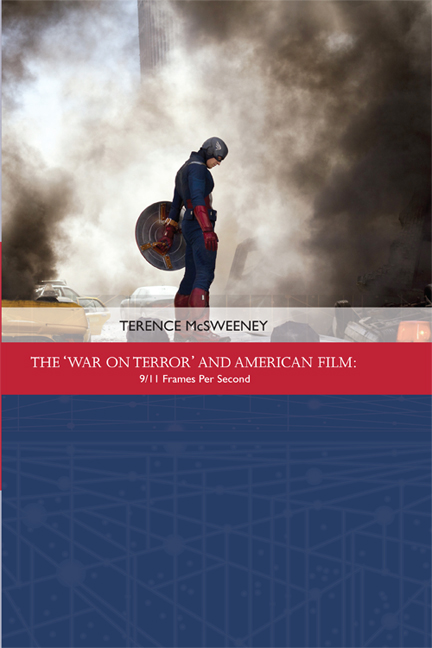Book contents
- Frontmatter
- Contents
- List of Illustrations
- Acknowledgements
- Introduction
- 1 The Lives of Others: Vulnerability in Post-9/ 11 American Cinema
- 2 Boots on the Ground: The New Millennial Combat Film as Cultural Artefact
- 3 ‘Masters of our own Security’: Redemption through Violence in the Post-9/ 11 Action Genre
- 4 Turning to the Dark Side: Challenging American Mythology in the Superhero Genre
- 5 Remaking 9/11: Imagining the Unimaginable in the Alien- invasion Film
- 6 Decade of the Dead: Zombie Films as Allegory of National Trauma
- 7 The Rise and Fall of Empires: The ‘War on Terror’ as Allegorical Moment in Historical Film
- Conclusion
- Bibliography
- Select Filmography
- Index
Introduction
Published online by Cambridge University Press: 05 August 2016
- Frontmatter
- Contents
- List of Illustrations
- Acknowledgements
- Introduction
- 1 The Lives of Others: Vulnerability in Post-9/ 11 American Cinema
- 2 Boots on the Ground: The New Millennial Combat Film as Cultural Artefact
- 3 ‘Masters of our own Security’: Redemption through Violence in the Post-9/ 11 Action Genre
- 4 Turning to the Dark Side: Challenging American Mythology in the Superhero Genre
- 5 Remaking 9/11: Imagining the Unimaginable in the Alien- invasion Film
- 6 Decade of the Dead: Zombie Films as Allegory of National Trauma
- 7 The Rise and Fall of Empires: The ‘War on Terror’ as Allegorical Moment in Historical Film
- Conclusion
- Bibliography
- Select Filmography
- Index
Summary
The films of a nation reflect its mentality in a more direct way than other artistic media … What films reflect are not so much explicit credos as psychological dispositions – those deep layers of collective mentality which extend more or less below the dimension of consciousness.
Siegfried Kracauer, From Caligari to Hitler: A Psychological History of the German FilmWhile the precise definition of post-traumatic stress disorder [PTSD] is contested, most descriptions generally agree that there is a response, sometimes delayed, to an overwhelming event or events, which takes the form of repeated, intrusive hallucinations, dreams, thoughts, or behaviours stemming from the event, along with numbing that may have begun during or after the experience, and possibly also increased arousal to (and avoidance of) stimuli recalling the events.
Cathy Caruth, Trauma: Explorations in MemoryEvery history really is two histories. There is the history of what actually happened, and there is the history of the perception of what happened. The first kind of history focuses on the facts and figures; the second concentrates on the images and words that define the framework within which those facts and figures make sense.
W. L. T. Mitchell, Cloning Terror. The War of Images, 9/11 to the PresentJust forty-eight hours after two hijacked jet airliners struck the World Trade Center (WTC) on 11 September 2001, the trailer for Sam Raimi's upcoming Spider-Man (2002) was hurriedly withdrawn from cinemas all across America. The short teaser, shot exclusively for marketing purposes and not consisting of scenes meant for inclusion in the final film, had shown the perpetrators of a smoothly orchestrated bank robbery fleeing in a helicopter through the skies of New York. Their celebrations, however, are abruptly brought to a halt, as somehow they become suspended precariously in mid-air, high above the city streets below. As the camera slowly pulls back, it reveals that they are actually caught in a giant spider's web, trapped between the imposing Twin Towers still dominating the Manhattan skyline. Not only was the trailer removed, but all of the film's posters in which the World Trade Center could be seen reflected in Spider-Man's eyes were also recalled.
- Type
- Chapter
- Information
- The 'War on Terror' and American Film9/11 Frames Per Second, pp. 1 - 31Publisher: Edinburgh University PressPrint publication year: 2014



